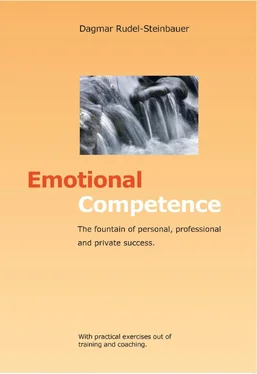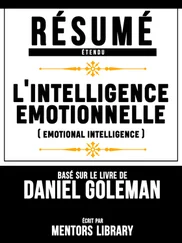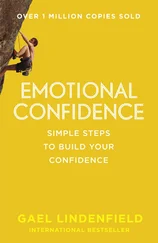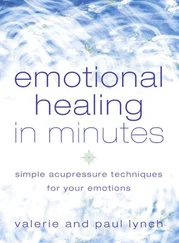Brain research has already given us the insight that our emotional center is activated when we make an analytical- rational or cognitive decision.
The emotional center and the cerebral cortex memorize occurrences independently but also function in parallel.
This can be seen in a simple example: should the eye register information e.g. sees a snake, this information will be processed first of all by the eye and then will be forwarded in a switching reaction through the thalamus to the emotional center as well as to the visual cortex. Both will compare this information with an earlier experience and then cause a reaction. These reactions are different from person to person. Therefore, these reactions could be one of the following:
Rational reaction: “run away”.
Emotional reaction: the feeling of “fear” arises.
As we see in this simple example, the interaction of the rational and emotional can actually be used in every different situation. Thus, human activity cannot be reduced to simple logic-analytical competences. In fact, the emotions react faster than the logic, more precisely: emotional processes operate faster, thinking processes operate more accurately.
A typical example: how often do we overreact emotionally e.g in anger or hurt, and say hurtful things to the person that we feel has spoken out of turn. Later on, as soon as our logic has been activated, we regret what we have said.
Our emotional System
“ People are not disturbed by things but by the view they have of them.”
Epiktet, Greek philosopher (about 50–125 A.D.)
We have an emotional system, a very distinctive network, which acts as a connection between emotions and understanding. In the course of a life, each human being builds up their own special network, which functions as a circle; thoughts are linked with emotions, emotions are linked with thoughts. Emotions color or influence our impressions and our impressions are colored by our emotions. 2
The view or meaning we give to different occurrences, combined with our feelings are very individual for each one of us. Each person has his or her own system of evaluation 3that develops and manifests itself through conscious or unconscious perceptions and opinions. When something has been evaluated, this evaluation is stored in our mind.
Thus it can happen and will happen that in situations that we have cognitively experienced previously, we automatically connect them and recall feelings from a former situation.
This can be disastrous, as an emotional bias can occur and new feelings cannot develop. Even when the overall conditions are different as, for example, when dealing with another person.
A simple example: assuming you have had a bad experience with a police officer who did not treat you right during a traffic control. What will be your reaction when you see a person in a police officer´s uniform or have a traffic check weeks, months or even years later? Your whole individual ratio-feeling network will be activated and the feelings that you experienced the last time will be recalled, possibly with the necessity of resistance and defense, until the current officer, being nice and polite, tells you that your right headlight is not working.
In many daily situations, our emotional network can be inhibiting. Unintentionally, we fall back on old familiar patterns and thus build up our own, not only rational but also emotional reality. Thereby, we are our own worst enemy because we do not let ourselves feel anew and evaluate situations for themselves.
Let us look at this in a sport´s setting: as a golf player, you may have one hole on the whole course where you happen to have difficulties. Alone the thought that you cannot manage this hole, cannot get over the pond or are always out of bounds cause anxious feelings every time you are in an aiming position. This anxiety cramps you, which affects your muscles and the whole energy flow of the body. This results in a bad shot. Again one has had difficulties at this hole, you were again proven right, namely that you have problems with this hole. We fall back on old patterns, although a new pattern of thinking, new feelings could make us successful.
Through evolution, we know that body, emotion and mind can be seen as one unity. 4
This system can be equally observed with humans as well as with animals. It is a sort of alarm system, which signals change (internal or external) and causes an appropriate reaction. This is what happens with the feeling of hunger (emotion): most of the time our stomach growls (body), our mind tells us that we need nourishment and so the unity body, mind and emotion has been established.
To understand how this unity works, imagine the reaction plans in the brain or in the amygdala. 5In these plans, the different groups of commands are issued to the body; e.g. with anger and rage, the muscles are tense and blood pressure rises, blood circulation increases which results in a red face or skin and produces more sweat.
That these emotions and emotional stress can have a permanent harmful effect on the body is evident in the list of psychosomatic diseases. Many medical studies demonstrate the longstanding damage on the heart and circulatory system resulting in years of unresolved feelings such as anger. According to this study, even 5 minutes of anger can negatively influence the circulatory system. 6
Many popular expressions demonstrate this cooperation of body and emotions: to “break one´s heart”, to “make one´s blood boil”, it “sits heavily on somebody’s stomach”.
We feel something, our body recognizes this and our language expresses it. The amazing thing is that many people (I think too many people) do not understand the language of their own body or ignore their bodies´ signals. It may be that they do not feel these signals, are imperceptible to these signs, have forgotten how to be aware of these or no longer know how to feel.
What are Feelings and Emotions?
“One can unconsciously have much knowledge, when one feels but does not know it.”
Fjodor Michailowitsch Dostojewski, Russian writer (1821-1881)
Feelings and emotions are often colloquially given the same definition or are confused. In this book, I also do not want to make a big difference between these two words. In my opinion, the two words “feeling” and “emotion” are as similar or as related as vacation/holiday or noodles/pasta.
Scientifically, the difference between feelings and emotions can be explained in the following way:
Emotion is a very complex process, which affects different mental but also psychological levels and represents something primary and permanent. Emotion (Lat. ex: out and motion: movement) is thus a process which is triggered through a conscious or unconscious perception.
Feelings are rather a subjective experience of the emotion; in a manner of speaking: the side effect of an emotion. Feelings can be identified as the complex affective component of human experience. It can be manifested through different forms such as pleasure-displeasure, love-dislike etc. Müller-Commichau 7describe feelings as following:” Generally feelings are the part of the “I” that has different senses that are called feelings- as can be evaluated by others, when one is a part of something, may it be only for a fraction of a second.”
Try to think of honey or of rock climbing in climbing. Depending on if you like honey or have no fear of heights, you may like it or maybe even take much pleasure in it. A person that does not like honey or has had a bad experience with heights will experience negative feelings.
Therefore, even though we connect them with rational thinking, feelings are actually subjective and are a result of personal experience and views.
We give a personal value to each of the impressions we collect in the course of our lives. In this way, we determined how this experience will influence our further actions and feelings.
Читать дальше












